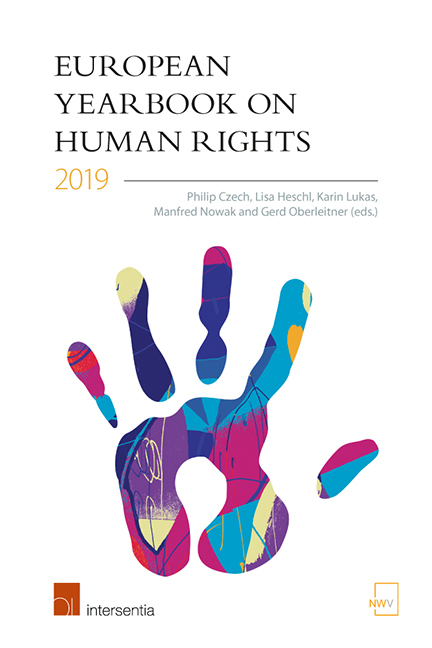Book contents
- Frontmatter
- Miscellaneous Frontmatter
- Editors’ Preface
- Contents
- List of Abbreviations
- List of Contributors
- PART I TOPIC OF THE YEAR
- PART II EU
- PART III CoE
- PART IV OSCE
- PART V REPORTS FROM THE FIELD
- PART VI OTHERS
- PART VII BOOK REVIEWS
- Lisa Heschl: Protecting the Rights of Refugees Beyond European Borders – Establishing Extraterritorial Legal Responsibilities
- Lorenza Violini and Antonia Baraggia (eds.): The Fragmented Landscape of Fundamental Rights Protection in Europe
- Panos Kapotas and Vassilis P. Tzevelekos (eds.): Building Consensus on European Consensus – Judicial Interpretation of Human Rights in Europe and Beyond
- Pieter van Dijk, Fried van Hoof, Arjen van Rijn and Leo Zwaak (eds.): Theory and Practice of the European Convention on Human Rights
- Adrienne Yong: The Rise and Decline of Fundamental Rights in EU Citizenship
- Jeroen Temperman, T. Jeremy Gunn and Malcolm Evans (eds.): The European Court of Human Rights and the Freedom of Religion or Belief – The 25 years since Kokkinakis
- Janneke Gerards: General Principles of the European Convention on Human Rights
- Index
Lisa Heschl: Protecting the Rights of Refugees Beyond European Borders – Establishing Extraterritorial Legal Responsibilities
from PART VII - BOOK REVIEWS
Published online by Cambridge University Press: 24 January 2020
- Frontmatter
- Miscellaneous Frontmatter
- Editors’ Preface
- Contents
- List of Abbreviations
- List of Contributors
- PART I TOPIC OF THE YEAR
- PART II EU
- PART III CoE
- PART IV OSCE
- PART V REPORTS FROM THE FIELD
- PART VI OTHERS
- PART VII BOOK REVIEWS
- Lisa Heschl: Protecting the Rights of Refugees Beyond European Borders – Establishing Extraterritorial Legal Responsibilities
- Lorenza Violini and Antonia Baraggia (eds.): The Fragmented Landscape of Fundamental Rights Protection in Europe
- Panos Kapotas and Vassilis P. Tzevelekos (eds.): Building Consensus on European Consensus – Judicial Interpretation of Human Rights in Europe and Beyond
- Pieter van Dijk, Fried van Hoof, Arjen van Rijn and Leo Zwaak (eds.): Theory and Practice of the European Convention on Human Rights
- Adrienne Yong: The Rise and Decline of Fundamental Rights in EU Citizenship
- Jeroen Temperman, T. Jeremy Gunn and Malcolm Evans (eds.): The European Court of Human Rights and the Freedom of Religion or Belief – The 25 years since Kokkinakis
- Janneke Gerards: General Principles of the European Convention on Human Rights
- Index
Summary
In light of recent global developments, notably the ‘refugee crisis’ in 2015, the European Union (EU) and its Member States engaged in various strategies to deal with the rise of unwanted migrants. Consequently, asylum and immigration issues are still high on the current political agenda of the EU.
The book on hand Protecting the Rights of Refugees Beyond European Borders deals with the issues concerning the extraterritorialisation of immigration control measures beyond actual territorial borders. There is already a rich body of literature on the more theoretical issues of international law in times of globalisation, particularly on the extraterritorial application of human rights law and the recent developments concerning EU immigration policies. There are, however, substantially fewer accounts that base their analysis on the law of state responsibility. In that regard, the author approaches the issues of extraterritorial immigration control measures from a legal responsibility perspective, deriving the relevant norms from both human rights and EU law, thereby analysing the matter from the most comprehensive normative perspective. The book is primarily concerned with the question of how to protect the rights of refugees and persons in need of international protection beyond the European borders. The main thesis is that the EU and the Member States remain responsible for human and fundamental rights obligations occurring in the context of extraterritorial immigration control measures.
The book consists of five chapters. Prior to the first chapter, an extensive table of cases and a table of treaties, instruments and legislation offers a great tool for finding the relevant cases and norms. The first chapter starts with a comprehensive overview of the background, the objective and scope of the book and concludes with an outline of the following chapters. Chapter 2 summarises the background that has led to the EU's current extraterritorialisation strategies, which the author demonstrates as a logical consequence of European integration. Chapter 3 then analyses how human rights principles can constrain the legitimacy of Member States when conducting extraterritorial immigration control measures based on bilateral cooperation agreements with third states. As a first step, the author examines the responsibility of Member States under human rights law, especially under the European Convention on Human Rights (ECHR), suggesting a new shift from an extraterritorial application of the Convention based on ‘jurisdiction’ to a truly universalist approach of human rights protection.
- Type
- Chapter
- Information
- European Yearbook on Human Rights 2019 , pp. 569 - 570Publisher: IntersentiaPrint publication year: 2019



